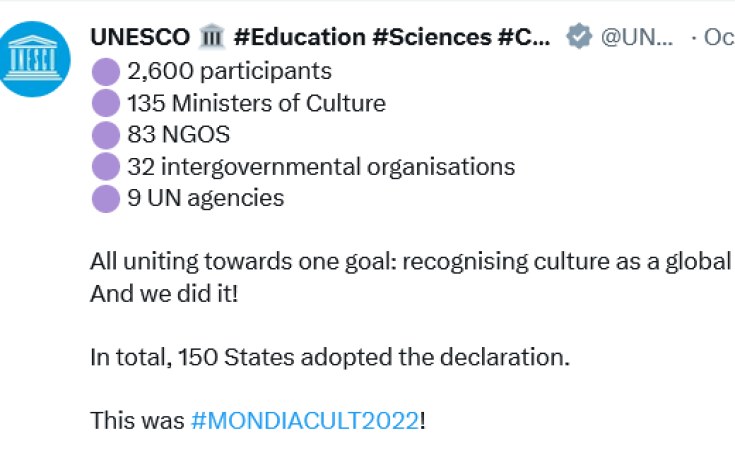Culture's status in global society got a major boost in 2022 when it was recommended to become its own sustainable development goal. This happened at the Unesco World Conference on Cultural Policies and Sustainable Development - called Mondiacult. The world's most important cultural policy gathering took place in Mexico City 40 years after its first edition in the same city. The 2022 meeting gathered 2,600 participants including 135 government ministers, 83 non-governmental organisations, 32 intergovernmental organisations and nine UN agencies.
Mondiacult is important because it's a decision-making meeting that helps shape the world's cultural policies and especially the relationship between culture and development. What was clear is that there is a shift in this relationship. Culture does not only contribute to sustainable development but is one of development's components.
Culture aids sustainable development goals in areas like health, education and environment. For example, local customs and traditional knowledge are relevant in promoting health programmes. Local and traditional products are useful for sustainable production. Indigenous knowledge helps develop environmental practices to fight climate change.
Sustainable development goals - like clean water and quality education - are the United Nations (UN) blueprint for a better future for all. At Mondiacult, culture was raised to the status of being its own sustainable development goal. A careful reading of the final declaration offers several reasons why:
1. Culture can fight climate change
Culture can contribute to the reduction of climate change's negative impact. Ecological organisations and other stakeholders are now interested in discovering the usefulness of cultural practices and other local know-how to preserve the environment. Ancient communities faced climate crises and developed their own resilient practices rooted in cultural heritage. That is why concepts like indigenous knowledge systems have emerged.
2. Digital must be ethical
The transition from analogue to digital has become an important aspect in the production, distribution and consumption of cultural and creative goods and services. The COVID-19 pandemic revealed the value of digital and online spaces. Augmented reality, for example, enables exploring museum collections from a phone or computer. Virtual reality enables the visiting of historical monuments. Blockchain technology and artificial intelligence have grown hugely, but bring new ethical concerns. Which is why Unesco has adopted a set of recommendations on the ethics of artificial intelligence.
3. Cultural diversity matters
Our world is made of many different cultures. Acknowledging and accepting this cultural diversity is an ethical imperative, in Mondiacult 2022's view. For the cultural ministers gathered in Mexico City, cultural diversity is the "founding principle of all of Unesco's cultural conventions, recommendations and declarations. It cannot be separated from respect for human dignity and all fundamental human rights."
4. Cultural objects must be returned
Another "ethical imperative" is the return of cultural assets to countries that they were looted from. The Benin bronzes case is a good example - ancient cultural objects stolen from Nigeria by colonial forces who are now slowly returning them. This restitution is crucial because it is supposed to "promote the right of peoples and communities to enjoy their cultural heritage ... to strengthen social cohesion and the intergenerational transmission of cultural heritage". It would be morally unfair to deny restitution, according to Mondiacult 2022.
5. Culture is a global public good
Culture is "our most powerful global public good", wrote Unesco official Ernesto Ottone:
Today, more than ever, we need to find meaning, we need universality, we need culture in all its diversity.
Culture is reaffirmed as the "existential foundation" of humanity in this period of multiple crises on the planet. Now that a high-level meeting like Mondiacult has affirmed that culture is a public good, it must be preserved in the same way as the environment is.
6. Culture is a development goal in itself
Most significant is a new momentum to give culture a central place in the global development agenda. Before Mondiacult, Unesco's aim was to convince the world's policymakers that culture can contribute significantly to achieving sustainable development goals. Now, Mondiacult 2022's ambitious final declaration affirms:
We call on the UN secretary general to firmly anchor culture as a global public good and to integrate it as a specific goal in its own right in the development agenda beyond 2030.
The cultural goal is to achieve "more harmony between peoples and communities". This could involve the promotion of cultural diversity, the return of cultural assets, increased budgets for creative activities and other policies.
Why this matters
If the UN adopts this option of culture being a sustainable development goal, the post-2030 sustainable development agenda will have new content. This will change how development agencies deal with culture and how universities teach the relationship between culture and development. The result could be more funding for culture, which is increasingly underfunded by governments.
In addition, making cultural diversity an "ethical imperative" should play a role, if possible, in discussions about the commercialisation of cultural goods and services and the digital transition.
Next to come will be Mondiacult's conditions of implementation. This is a follow-up action plan that should mobilise stakeholders to embrace Mondiacult's outcomes ahead of the 2024 UN Summit of the Future.
Ribio Nzeza Bunketi Buse, Associate Professor, University of Kinshasa


